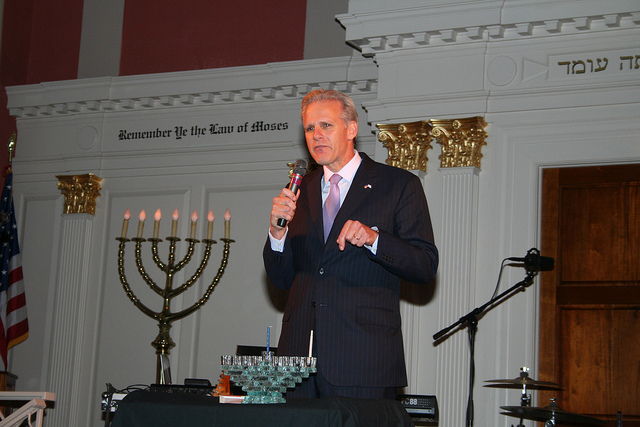Last week, Thomas Friedman wrote a column criticizing Republican presidential candidates for pandering to Israel and ignoring what was in the best interests of both Israel and the United States. He also spared more than a few words to express his concern over the fact that more and more US Jews are drifting away from Israel.
Sounds like pretty standard fare for Friedman. However, two sentences drove the rightwing blogosphere into a frenzy. Friedman wrote: “I sure hope that Israel’s prime minister, Benjamin Netanyahu, understands that the standing ovation he got in Congress this year was not for his politics. That ovation was bought and paid for by the Israel lobby.”
That was one of the least controversial statements Friedman made in his piece. The truth of it is self-evident. And yet, reactions to it from certain quarter were downright apoplectic. Israeli Ambassador Michael B. Oren had this to say:
“The term ‘Israel lobby’ implies the existence of a Zionist cabal wielding inordinate economic and political power. Unintentionally, perhaps, Friedman has strengthened a dangerous myth.”
Now that is clever. Here is what Oren is actually saying: Most Americans support Israel, but also believe the US should be even-handed in its foreign policy. Friedman undermines the one-sided narrative that sustains Israel’s massive military and diplomatic support because he wants to see an Israel whose democracy is stable and is at peace with its neighbors. My government doesn’t want that, therefore anyone, Jewish or otherwise, who supports a view like Friedman’s will be smeared as a Jew-hater.”
Oren couches what he says with a couple of buzzwords. “Cabal” is a word closely associated with anti-Jewish conspiracy theories. Thus Oren implies anti-Semitism without actually accusing Friedman if it.
He also refers to the cabal as “Zionist” rather than Jewish, but makes sure to add the idea of economic power (the “bought and paid for” term implies political clout, not overwhelming wealth), which Friedman made no comment about, to add to the image of anti-Semitism he is trying to paint.
There is nothing mythical about the Israel Lobby, though its power is, at times, exaggerated. And, indeed, the constant ovations during Bibi’s address to Congress reflect that.
The useful trick that is often employed is to load up statements with anti-Semitic language, implying the accusation even if you also include a denial of making it. So, Jews and money is a classic anti-Semitic trope, and Oren adds in “inordinate economic power” to make that claim.
In reality, the Israel Lobby mobilizes far less campaign money than the real heavy hitters. Some of the campaign contributions can’t really be nailed down, because politicians (wrongly) assume that corporate and individual donations that are given or controlled by individual Jews depends heavily on a hawkish stance regarding Israel. If J Street can ever be successful at any one thing, I’d hope dispelling that myth is the one.
Nothing related to Israel or foreign policy is reflected in the list of top 20 PACs in campaign contributions in any election cycle. Large corporations, unions and business associations dominate every list of top donors.
According to Open Secrets.org, in the 2010 election cycle, 31 pro-Israel PACs donated $2.962 million. In 2008, 32 of them donated $3.138 million. In the context of a nationwide election, with hundreds of races, that’s not a ton of money. It’s a lot as far as single-issue PACs go, but next to, for instance, Labor PACs, of which there were 55 that gave $16.128 in 2010, or business PACs, which 31 gave $12.040 million, it is obviously much smaller.
Still, the money is very important because it is all pressure in one direction. Much of it (J Street’s PAC is the only serious exception) pushes a hard-line policy on Israel, and there is virtually no money coming in to counterbalance it. The ridiculous claim of an “Arab Lobby” refers to lobbyists who are pushing their own countries’ business and security interests. Israel and the Palestinians are rarely mentioned by them.
But the focus on money ignores the much more powerful issue of Israel as a mythical figure in US discourse.
Rep. Steve Rothman, a Democrat, responded to Friedman’s piece (a piece, incidentally, whose main thrust was to attack the Republicans) by saying, “I gave Prime Minister Netanyahu a standing ovation, not because of any nefarious lobby, but because it is in America’s vital national security interests to support the Jewish State of Israel and it is right for Congress to give a warm welcome to the leader of such a dear and essential ally.”
A warm welcome is fine, but twenty-nine standing ovations requires a much better explanation. Especially when the leader making the speech is not at all popular among US Jews. It was pandering, pure and simple, to the Jewish donors they think like Netanyahu (many don’t, but a good number of prominent ones do) and the legions of Christian evangelicals whose “support” of Israel makes some of the settler groups look like doves.
That image was recalled very aptly by the radical neoconservative (who once was convicted of perjury for lying to Congress) Elliot Abrams: “Members of Congress in a country that is two percent Jewish stand to applaud Prime Minister Netanyahu because they, like their constituents, support Israel and want America to support Israel. Many of those standing and cheering were from districts where there are no Jews or a handful of Jews, and where Evangelical churches form the strongest base of support for the Jewish state. Now perhaps Mr. Friedman means those churches when he refers so nastily to the “Jewish Lobby,” but I doubt it. ”
Abrams refers here to the “Jewish lobby,” which Friedman did not say. Jewish and Israel are not synonyms. Someone should teach Mr. Abrams this elementary fact. But this is Abrams’ way of coloring the discussion, turning it upside down to portray those who disagree with Israeli policies as anti-Semites.
More importantly, he paints a simplistic picture: Agree with Netanyahu or you’re anti-Israel. Deny the existence of a lobby that is loud and proud, and on the record, or you hate the Jews and Israel.
It’s typical, but absurd. The Israel Lobby obviously exists, as much as any lobby. It may or may not be “nefarious,” as Rothman says, but acknowledging its powerful influence on Congress is not proof of anything but its effectiveness.
But that lobby does not pursue Israel’s wellbeing. Instead, it promotes its own vision of what Israel’s future should be, and that of the entire Middle East as well. This “Israel” lobby takes something very real–overwhelming support among Americans of Israel’s existence, regional peace and security– and twists it into blind support for Israel’s colonial occupation of Arab territories, something many Americans don’t even know about, and very few understand.
That is what alienates young Jews from Israel and the organized community that is so strongly tied into that Lobby. That is what Tom Friedman was talking about.
****
POSTSCRIPT: As I was writing this article, Friedman issued a statement regretting his choice of words. Some saw this as walking back from his statement. I’m not so sure.
He wrote: ““In retrospect I probably should have used a more precise term like ‘engineered’ by the Israel lobby — a term that does not suggest grand conspiracy theories that I don’t subscribe to,” Friedman said. “It would have helped people focus on my argument, which I stand by 100 percent.”
That doesn’t sound like walking back to me. It reads more like he knows it’s not only about campaign contributions and that the warping of “pro-Israel” to mean support for a far-right government that wishes to sustain the occupation by many other means.
Photograph courtesy of IsraelinUSA. Published under a Creative Commons license.





